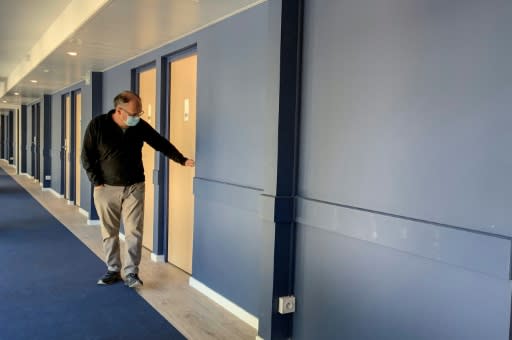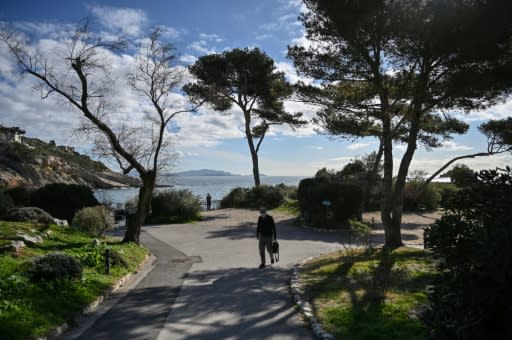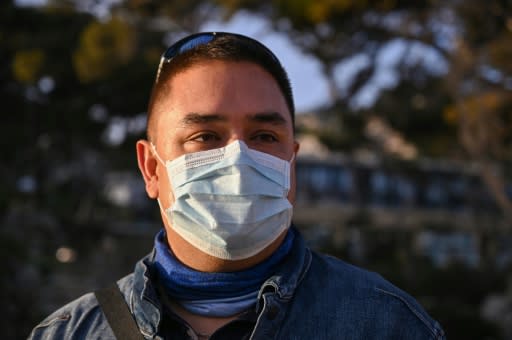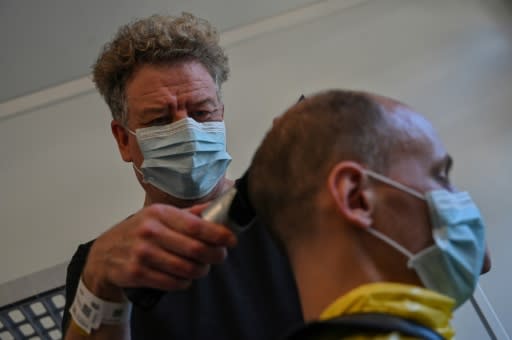Wuhan evacuees seek semblance of normality in French quarantine
A barber offers expert haircuts, a teacher gives lessons in French as a foreign language and participants practise the Chinese art of Tai chi. The scenes at a holiday village on France's balmy Mediterranean coast west of Marseille sound like they could be from any of the all-inclusive vacation camp so popular with tourists. But there is a difference. The guests are not tourists staying at the holiday camp in Carry-le-Rouet of their own free will. They all wear sanitary masks and follow strict rules. And their health is checked repeatedly by a medical team. The over 200 people staying here, including an AFP reporting team, are all people evacuated from the Chinese city of Wuhan stricken by the coronavirus epidemic that has claimed over 800 lives in China and spread around the world. The AFP team had travelled from Wuhan on the French plane that repatriated the evacuees and then themselves had to obey the quarantine formalities. At the holiday camp, the evacuees have to observe a strict 14-day period of quarantine -- judged to be the incubation time for the virus -- before being allowed contact with the outside world again. Inside, in an ornate hall with blue curtains that normally hosts performances for tourists, one of those repatriated Vincent Lemarie explains to non-French speakers the basics of the language. The adult pupils from China and some from Latin America repeat in chorus the basic words in French to introduce oneself. Not all of those repatriated are French citizens and Lemarie, 48, every morning gives two hours of his free time to those who have ended up in France without ever expecting to. In the afternoon, he turns pupil and takes a class in Chinese. - 'People know what to do' - A few metres from the adults, children evacuated from Wuhan are also writing things down under the gaze of their teacher who is trying to follow the school curriculum. Most of those present at Carry-le-Rouet arrived on January 31 in a first plane and the others on February 2. So far, no one has shown symptoms of the coronavirus, according to the most recent tests. Despite the holiday camp setting, the conditions of the quarantine are strict -- the mask has to be worn, the temperature is taken twice a day and there is a total prohibition on physical contact with the outside world. "People get up and they know what to do to keep busy during the day," said Charles Germain, 38, who started a messaging group so that residents can keep abreast of what is happening at the centre. Germain, who comes from the French Pacific island of New Caledonia and is now apart from his wife who stayed in Wuhan, said the residents had no idea what to expect at the start. Initially "we thought that we would be followed by doctors round the clock". "You could just spend two weeks in your room and you are not going to die. But I think people would get depressed," he said. Germain, a practitioner of Tai chi, said such activities allow the residents "to find again the social connections that we lost while effectively in quarantine in China." The Chinese authorities, in a bid to contain the spread of the virus, have cut Wuhan off from the outside world and those in the French quarantine camp say they already know how confinement feels. In Wuhan, "we had our family links at home but nothing more. We had no contact with the outside world," Germain said. But Germain insists that this is no holiday. "We did not choose to be here," he said, adding that the majority of those in the camp had made a life for themselves in China. They also have no idea when they might go back. - 'Needed contact' - Yann, 55, ran a barber's shop in Wuhan for four years where 70 percent of his clients were foreigners. Suddenly, his life has changed. He recalls with a shudder the boredom and isolation in his Wuhan apartment in the days leading up to the repatriation. The trauma of this period caused him hypertension once he had arrived in France. "When I was still in China I did not recognise the stress that all of this was causing," he said. The quarantine was allowing him to pull himself back together, he added. He has even set up his own barber's salon at the holiday camp; at the start he simply helped out a regular client who was also at the camp but then word of mouth saw the number of customers doubling every day. Now people even need to make an appointment with him and he charges whatever they want to give. There is not much space and the equipment is to say the least basic. There might be a mirror but there is no water for a shampooing: the rules of quarantine mean that hair cannot be washed, every client brings their own brush and Yann disinfects his tools systematically. Carrying out his trade in the holiday village "has really perked me up. I needed contact with people and to create pleasure around my work". This unique experience, with all its ups and downs, ends on Friday when the quarantine ends and the evacuees will leave in different directions and start to build a new life, without knowing when they can go back to China. Many have no idea what will happen to them. Yann the barber thinks he might temporarily be able to work with a friend in the north of France. Charles Germain has one wish -- to get together with everyone over a drink back in Wuhan when the situation allows. Vincent Lemari�, rapatri� de Wuhan quitte sa chambre dans le centre de vacances de Carry-le-Rouet, le 7 f�vrier 2020 La r�sidence Vacanciel � Carry-le-Rouet, pr�s de Marseille, o� sont confin�s des habitants de Wuhan, le 7 f�vrier 2020 Charles Germain, l'un des rapatri�s de Wuhan, donne une interview � l'AFP � Carry-le-Rouet le 7 f�vrier 2020 Yann, qui avait un salon de coiffure � Wuhan, coupe les cheveux d'autres rapatri�s dans le centre de Carry-le-Rouet o� tous sont confin�s, le 7 f�vrier 2020




